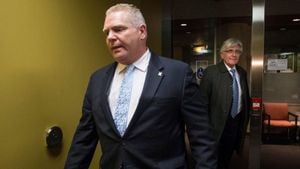The Biden administration has recently introduced significant changes to how banks handle overdraft fees, following through on promises to mitigate excessive banking charges impacting everyday Americans. With many consumers facing the brunt of these additional fees, often termed "junk fees," the announcement of capping overdraft fees could help save consumers considerable amounts of money over time.
The final rule, put forth by the Consumer Financial Protection Bureau (CFPB), will establish stricter limits on overdraft fees, capping them at $5—a considerable drop from previous amounts, which often reached upwards of $35. This change could represent roughly $5 billion saved for consumers nationally, with estimates indicating households could see around $225 less taken out of their checking accounts each year due to these excessive charges.
Rohit Chopra, the director of the CFPB, expressed concern over what he described as exploitative practices by large banks and credit unions. “For far too long, the largest banks have exploited a legal loophole,” Chopra said, referring to the past charging practices where banks took advantage of unforeseen circumstances to impose steep overdraft fees.
The policy applies to large banks and credit unions with over $10 billion in assets, which dominate the U.S. banking sector. While many consumers will welcome the change, banks have pushed back against this proposed rule, asserting it could severely limit their ability to offer emergency credit options to customers.
Overdraft fees often occur when consumers attempt to spend money they don’t have available after their accounts hit zero, leading banks to temporarily lend them the amount needed to cover the transaction but charge hefty fees on top of what is perceived as borrowed money. According to the CFPB, nearly 23 million households pay overdraft fees each year.
Before the new regulations, many consumers could find themselves paying several overdraft fees simultaneously, compounding their debt. For example, purchasing something for just $3 could end up costing consumers more than $30 due to the associated fees. Given this troubling reality, both governments and consumer advocates have been pushing for reforms.
While some banks have recently begun to reduce or eliminate overdraft fees through their programs, many continue to charge significant fees under existing rules. Bank of America, for example, scaled back its overdraft fees from $35 to $10 last year, reflecting some movement within the industry compelled by market pressure.
The rule is set to take effect on October 1, 2025, creating uncertainty among consumers and banks alike. Concerns have been raised about the consequences under the new Trump administration potentially rolling back protections and consumer safeguards if they gain control of Congress.
Despite supportive sentiments from consumer advocacy groups emphasizing the need for change, lending associations, like the American Bankers Association, argue against capping overdraft fees. They recognize the challenges it may pose, claiming it could risk consumers being left without viable financial emergency options. Banks contend they may need to change their business models significantly, potentially leading to less access to basic financial services for lower-income families.
Some consumer advocates are thrilled by the new rules, believing it will finally put pressure on banks to provide fairer and more accessible financial products. According to the National Consumer Law Center, current practices have contributed to financial despair among low-income communities, with countless households becoming trapped by mounting debt due to practices underwritten by high fees.
The new rule allows banks to either impose the flat $5 fee, determine their costs and charge accordingly, or maintain higher fees as loans, so long as they disclose the terms clearly—similar to how traditional loans operate. This aims to offer transparency on lending practices, ensuring consumers understand what they might owe if they overdraw their accounts.
There's also optimism surrounding the relief it could bring to those vulnerable communities currently struggling under the burden of overdraft-related fees. More than just saving costs, these changes could help facilitate healthier banking habits as customers become more financially literate and empowered.
Despite the upcoming changes, the critique of the new regulation has been vocal from industry leaders. Rob Nichols, president of the American Bankers Association, remarked on the CFPB's move as "misguided" and stated they would thoroughly review the rules moving forward. Their concern centers around whether these restrictions infringe upon banks' rights to manage their fee structures effectively.
Under the final rule, banks will soon have to reevaluate how they approach overdraft services. Some institutions may choose to abandon overdraft services altogether, leading to potential adverse effects for the very consumers meant to be protected.
Meanwhile, the spotlight on overdraft fees provides more significant opportunities for discussions about broader banking reform. Consumer advocates hope the successful legislation may serve as momentum for future policies aimed at improving financial access and decreasing exploitative banking practices across the industry.
Both consumers and financial institutions await the rollout of these reforms to see how the new rules intersect with existing economic realities. The potential for progress looms large amid the uncertainty as the nation anticipates the impact of these changes to come.
Over time, as the dialogue around these issues continues, it will be imperative to monitor how these regulations will affect not just overdraft fees but other associated financial practices, especially as we near 2025 and beyond.



